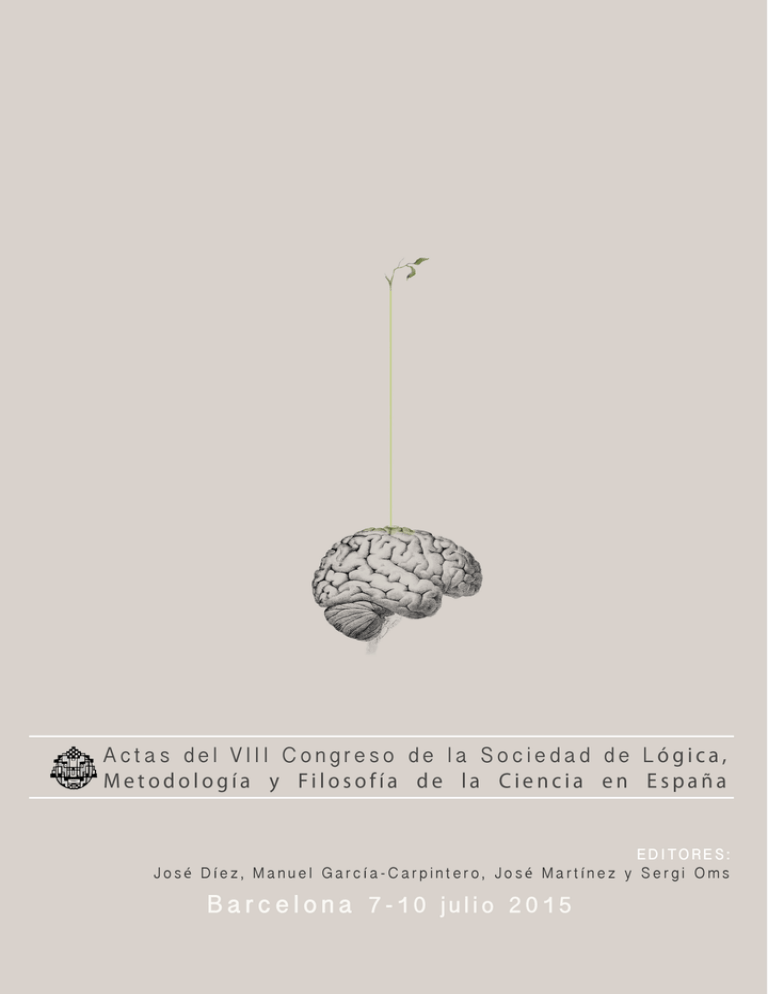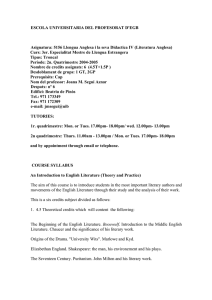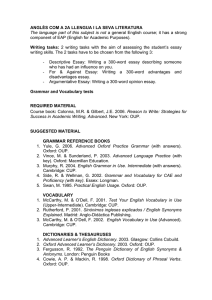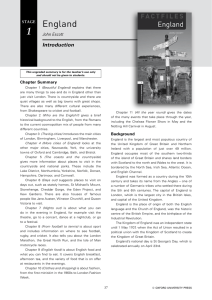Sección B – Filosofía del lenguaje
Anuncio

Actas del VIII Congreso de la Sociedad de Lógica, Metodología y Filosofía de la Ciencia en España Barcelona, 7-10 de julio de 2015 Actes del VIII Congrés de la Societat de Lògica, Metodologia i Filosofia de la Ciència d’Espanya Barcelona, 7-10 de juliol de 2015 Proceedings of the VIII Conference of the Spanish Society for Logic, Methodology and Philosophy of Science Barcelona, 7-10 July 2015 Comité Organizador Local (UB) Comité organizador José A. Díez Calzada Manuel García-Carpintero Sánchez-Miguel José Martínez Fernández Sergi Oms Sardans Concepción Martínez Vidal (Presidenta SLMFCE, USC) Antonio Blanco Salgueiro (U. Complutense) María Caamaño Alegre (U. de Valladolid) María Cerezo Lallana (U. de Murcia) Valeriano Iranzo García (U. València) Inmaculada Perdomo Reyes (U. Laguna) Francisco Salguero Lamillar (U. Sevilla) 2015 Universitat de Barcelona Editado por: José A. Díez Calzada Manuel García-Carpintero Sánchez-Miguel José Martínez Fernández Sergi Oms Sardans Diseño de cubierta: Cristina Zafra Vizcaíno Maquetación: Óscar Cabaco Olmedo ISBN: 978-84-606-9303-1 Instituciones patrocinadoras: This work is under a Creative Commons BY-NC-SA 3.0 license. Any form of reproduction, distribution, public communication or transformation of this work not included under the Creative Commons BY-NC-SA 3.0 license can only be carried out with the express authorization of the proprietors, save where otherwise provided by the law. You can access the full text of the license by clicking on the following link: Creative Commons License Esta obra se encuentra bajo una licencia Creative Commons BY-NC-SA 3.0. Cualquier forma de reproducción, distribución, comunicación pública o transformación de esta obra no incluida en la licencia Creative Commons BYNC-SA 3.0 solo puede ser realizada con la autorización expresa de los titulares, salvo excepción prevista por la ley. Puede acceder Vd. al texto completo de la licencia haciendo clic en este enlace: Licencia Creative Commons www.ub.edu/slmfce8 Sarrión Morillo, Enrique Nuevas modelizaciones formales de la abducci´on y sus aplicaciones ...................................................... 60 Sforza Fogliani, Maria Paola What the tortoise did not say to Achilles ................................................................................................... 68 Terrés Villalonga, Pilar Intensional connectives and relevant logic: a case for logical pluralism ................................................... 71 Sección B – Filosofía del lenguaje Blanco Salgueiro, Antonio (Universidad Complutense) ¿Es tan cognitiva la teoría "cognitiva" de la metáfora? .............................................................................. 75 Bordonaba, David (University of Granada) From content disagreement to normative disagreement ............................................................................. 81 Campdelacreu, Marta (UB) Sutton's Solution to the Grounding Problem and Intrinsically Composed Colocated Objects; In Search of a Complete Solution............................................................................................................... 86 Corredor, Cristina (Universidad de Valladolid) The limits to freedom of expression: arguments in the public sphere ........................................................ 88 Diaz-Leon, Esa (UB) Pejorative Terms and the Semantic Strategy .............................................................................................. 90 Eisenthal, Joshua (University of Pittsburgh) Wittgenstein's So-Called Logical Atomism ............................................................................................... 92 Escalonilla, Alicia (Universidad Complutense) La Recursión como tercer salto funcional en la evolución del lenguaje .................................................... 97 Fadeeva, Yuliya (Duisburg-Essen University) Is a radical form of conceptual incommensurability defeasible? A defense of Donald Davidson. ............100 Fernández Moreno, Luis (Universidad Complutense de Madrid) Some "Other Words": The Putnam Case.................................................................................................... 102 Fernández Soutullo, Ainoha (USC) Kripke contra la teoría de la identidad: una defensa de la ruta esencialista hacia lo necesario a posteriori ................................................................................................................................. 107 Frapolli, Maria Jose (University of Granada) Villanueva, Alberto Neftalí (University of Granada) Put context first. Expressivism and context-dependence ........................................................................... 112 García, Patricia (Universidad Complutense de Madrid) Acto de habla total en la situación de habla total: dimensión deóntica ...................................................... 116 Geirsson, Heimir (ISU) Empty Names: An Error Theoretic Account .............................................................................................. 123 Put context first. Expressivism and context-dependence* Frapolli, Maria José (University of Granada) Villanueva, Alberto Neftalı́ (University of Granada) John MacFarlane has recently claimed that his own kind of relativism and contemporary expressivism, more specifically, the one defended by Allan Gibbard, ‘use essentially the same compositional semantics’ (MacFarlane 2014, 172). This claim, despite being accurate, might obliterate a fundamental difference between the expressivist analysis and other semantic approaches. Expressivism, we will argue, is in general compatible with standard compositional semantics, but its basic take on how analysis should proceed concedes no priority to the principle of compositionality, but rather to the principle of context. Under expressivism, content is individuated by the inferential import, and thus the compositionalist –building-block– order of explanation is challenged. The aim of this paper is twofold. First, we will contrast two different models to accommodate context-dependence, the phenomenon that our linguistic practices require contextual information to be explained. The building-block model, on the one hand, and the organic model, on the other, can be set apart by taking into consideration whether they give prominence to the principle of compositionality over the principle of context, or the other way around. Second, we will defend that expressivism, unlike relativism and other competitors, fits nicely under the latter, organic, model. The expressivist analysis necessarily starts from considerations about the kind of actions that agents perform when using linguistic structures, rather than deriving these range of possible performances from previously held properties of these structures. 1. Context-dependence: two different models Context-dependence under the building-block model. There is almost no theory of meaning available that aspires to explain our meaningful communicative exchanges in a way that is completely independent of contextual considerations. At one level or another, any theory will assume that whatever we can say about the meaning of a string of symbols, as viewed –if such a thing were possible– in isolation, differs from what a normal speaker would say while uttering it, or an audience would get while understanding it. Under the building-block model, meaning’s order of explanation proceeds in successive stages, starting from the most basic considerations and building up from them. At any level, information from the context might be acknowledged by different theoretical alternatives. Depending on the stage at which contextual information has an impact, pragmatic processes might be: Prelinguistic. Input: unsegmented marks or sounds, not recognized as signs belonging to a language.Output: a piece of discourse. Lexical. Output: an univocal string of words. ‘I saw her duck under the table’. Only when ‘duck’ is interpreted, either as a verb or a noun, we proceed to the following stage. Syntactic. Output: an univocal structure. ‘The king of France is not bald’. ‘Every ball has a red dot on it’. ‘Every kid at school owns a pet, the school turtle’. * This work was partially funded by the research project ”Naturalismo, expresivismo y normatividad” (MINECO: FFI2013-44836) 112 Frapolli, Maria José; Villanueva, Alberto Neftalı́ Pre-semantic. Output: an univocal set of meanings cum a structure. Reference-fixing for indexicals and disambiguation. Semantic. Output: A proposition (Aristotelian or Fregean). Quantifier domain restriction, modulation, etc. Typically associated with local pragmatic processes. Context of utterance. Post-semantic. Output: a proposition plus a circumstance of evaluation. Typically associated with global processes. Context of assessment. Pragmatic. Output: multiple propositions. Secondary inferential processes, not subpersonal. Implicatures Depending on the way in which contextual information is accounted for, pragmatic processes might be: Primary / secondary. For theories that defend a principled distinction between the semantic core of our utterances and other levels of meaning conveyed, primary pragmatic processes will be those affecting the semantic core, what is said, and secondary pragmatic processes will derive other layers of propositional content inferentially from what is said plus other contextual considerations. The latter will typically have an impact at the pragmatic level, even though interactions with other –lower– levels are recognized by some approaches, such as Relevance Theory. Local / global. Local pragmatic processes have an impact on subsentential phrases, global pragmatic processes modify the circumstances of evaluation, placing the whole sentence, as it were, under a different light to be evaluated. These are usually identified at the postsemantic level. Mandatory / optional. A pragmatic process is mandatory if its intervention is necessary in order to arrive to a level of content which can be evaluated as true or false, in order to arrive to a propositional level of content. Otherwise, it is optional. Mandatory* / optional*. A pragmatic process is mandatory* if its intervention is “recruited” by the linguistic meaning of a lexical item, as it occurs in the sentence. Otherwise, it is optional*. Indexicals trigger mandatory* pragmatic processes. These processes are also deemed sometimes ‘bottom-up’ vs. ‘top-down’ processes We will briefly showcase the differences between the uses of context in Stojanovic’s form of invariantism (cfr. Stojanovic 2008), and Capelen and Lepore’s speech act pluralism (Capelen and Lepore 2005). Within the realm of contextualism, indexical and non-indexical contextualism (cfr. MacFarlane 2007, 2014) should be distinguished both from Truth- Conditional Contextualism (cfr. Recanati 2010) and Relevance Theory (Carston 2002). Relativism (Kolbel 2008), moderate relativism (Recanati 2007) and assessment relativism (MacFarlane 2014) will be also set apart, and their respective uses of context will be examined. All of them will be examples, nonetheless, of a building-block use of context. Context-dependence under the organic model. According to the organic model, the basic unit of analysis has to be able to move the chain on the conversational scoreboard, and thus the analysis should take as primitive only linguistic units that can be used to acquire certain inferential commitments. In this sense the context is not needed to fill in the holes left in the logical form by semantic underdetermination, but rather to supply the information that is needed to make sense of a certain communicative exchange. Judgments can only be individuated inside a given context, and this makes this model context-dependent, but context provides information in a way that cannot be equated to those mentioned above. The building-block model is a useful heuristics, and as such the results of formal semantics are not globally challenged, but they have to be cast under a different light. The immediate data that people engaged in assertive speech acts encounter are contents of a propositional nature. Semantic analysis individuates the ingredients of these contents, which might turn out to draw different results depending on the aim of the speech act at stake. In spite of its hippylooking wording, this is by no means revolutionary, from a historical point of view. Frege defended this position over and over (see for instance, Frege 1879/1972, §2 and §9, where he places judgments at the beginning of the analysis process, and 1918-9/1984, where he argues that negation does not belong to the thought but to its expression, p. 378 and p. 380). The Russellian analysis of descriptions as incomplete symbols is also a classical application of this model (Russell 1905). 113 Frapolli, Maria José; Villanueva, Alberto Neftalı́ 2. Expressivism and organic context-dependence Classical Expressivism analyzed sentences with ethical terms, ‘cheating on your husband is bad’, as having the general import of ‘boo for cheating!’. The use of declarative sentences can elicit a propositional content, a covert imperative, or an expression of feelings without truth-conditions. Which alternative is in each case appropriate depends on the identification of the speaker’s intention, an issue that requires a correct reading of contextual factors. From the semantic core of expressivism, one can draw the paralyzing conclusion that expressive terms are meaningless (nihilism, from Gödel 1947, p. 520 to Künne 2005, p. 87), and qualify the speech acts in which they occur as defective. A more constructive path is approaching the analysis of sentences with expressive terms organically. The strategy has proved to be successful in different domains. Minimal Expressivism, as a kind of inferentialism applied to higher-order concepts, abstracts the meaning of expressive terms from the inferential import of the contents of the sentences in which they occur. The ‘expressivists’ strategy’, as Gibbard puts it ‘is to change the question. Don’t ask directly how to define ‘good’. . . shift the question to focus on judgments: ask, say, what judging that is good consists in’ (Gibbard 2003, 6). This pattern applies to a wide variety of topics. Gibbard (2012) applies it to semantics and defines meaning as a normative concept, and it has also been applied to the analysis of knowledge ascriptions (Chrisman 2007, Chrisman 2011, Field 2009), first-person ascriptions (Bar-On 2005), and other constructions. Within the realm of the organic model of context-dependence, contemporary expressivism needs to be distinguished from classical expressivism, and from different versions of hybrid expressivism (see Field 2009, Chrisman 2007, but also Bar-On 2005), but also from two different extreme views on content individuation. The first one of these is inferential holism. According to this view, the content of a unit is individuated by all the inferences it gets involved with in common practice –every inference is a meaning-determining inference. The second one is historical inferentialism, a view that provides a very limited number of meaning determining inferences, mimicking Gentzen-like rules of introduction and elimination for logical constants. Expressivism, we will defend, needs to stick firmly to the idea that the set of meaning-determining inferences is not, and cannot be, determined a priori. Only that is, truly, putting context first. References Ayer, A. (1936), Language, Truth, and Logic. London: Victor Gollancz LTD. Bar-On, D. (2005) Speaking My Mind, Oxford: OUP Cappelen, H. and Lepore, E. (2005) Insensitive semantics: a defense of semantic minimalism and speech act pluralism. Oxford: Blackwell. Carston, R. (2002) Thoughts and Utterances: The Pragmatics of Explicit Communication. Oxford: Blackwell. Chrisman, M. (2007) “From Epistemic Contextualism to Epistemic Expressivism” Philosophical Studies 135(2): 225-254. Chrisman, M. (2011) “Epistemic Expressivism” Philosophy Compass 7(10): 118-126. Egan, E. and Weatherson, B. (eds.) (2011), Epistemic Modality, Oxford University Press. Field, Hartry (2009). “Epistemology without metaphysics”, Philosophical Studies 143(2): 249–90. Frege, G. (1879/1972), Conceptual notation and related articles, with a biography and introduction. Translated and edited by T. W. Bynum, Oxford Uni. Press, 1972. Frege, G. (1918-9/1984), “Negation”. In Collected Papers on Mathematics, Logic, and Philosophy. Edited by Brian McGuinness. Basil lackwell 1984, pp. 373-390. Gibbard, Allan (2003). Thinking How to Live, Harvard University Press, Cambridge, MA. Kölbel, M. (2009) “The Evidence for Relativism”. Synthese 166: 375–95. Gödel, K. (1947), “What is Cantor’s Continuum Problem?” The American Mathematical Monthly, Vol. 54, No. 9 (Nov., 1947), pp. 515-525 Künne, W. (2005), Conceptions of Truth. Clarendom Press MacFarlane, J. (2007). Semantic minimalism and nonindexical contextualism. In G. Preyer & G.Peter (Eds.), Content and context: Essays on semantics and pragmatics. Oxford: Oxford University Press. 114 Frapolli, Maria José; Villanueva, Alberto Neftalı́ MacFarlane, J. (2014) Assessment Sensitivity: Relative Truth and Its Applications. Oxford, Oxford University Press. Recanati, F. (2010) Truth-Conditional Pragmatics, Oxford: Oxford University Press. Russell, B. (1905), “On Denoting”. Mind, New Series, vol. 14, No. 56, pp. 479-493 Stojanovic, I. (2007) ”Talking about Taste: Disagreement, Implicit Arguments, and Relative Truth”. Linguistics and Philosophy 30: 691-706. Stojanovic, I. (2008) What Is Said: an Inquiry into Reference, Meaning and Content. Saarbrucken: VDM Verlag Dr. Müller. Smith, B. (2012) Relativism and Predicates of Personal Taste. In Francois Recanati, Isidora Stojanovic & Neftali Villanueva (eds.), Context-dependence, Perspective and Relativity. De Gruyer Mouton (2010) 115




